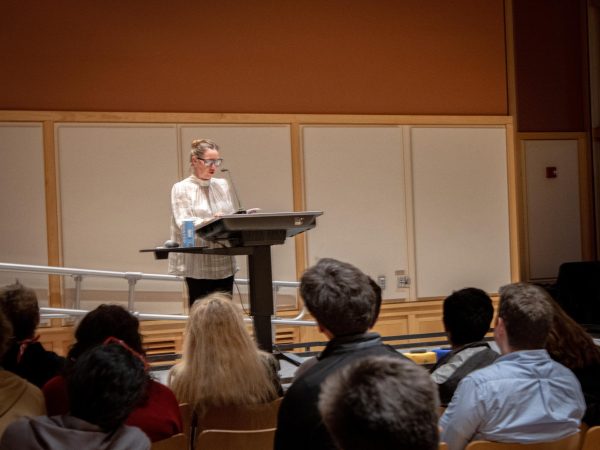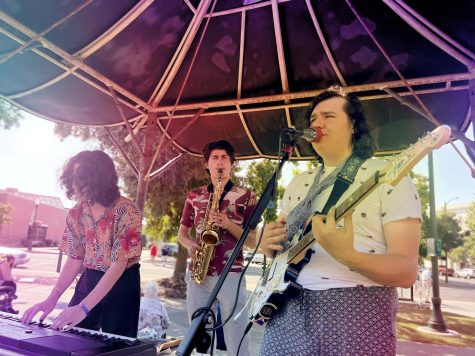Ana Maria Spagna Provides Evening of Nonfiction Reading
October 21, 2017
Professor Ana Maria Spagna’s stories visibly enraptured audience members as she read aloud selections from her works in Kimball Auditorium on Thursday, Oct. 19. This reading was part of Whitman’s Visiting Writers Reading Series, which started in 2000 as a desire to bring enthusiastic and diverse writers to Whitman’s campus and has since brought a wide variety of writers to campus. With five books of nonfiction writing, a novel and numerous published works under her belt, Spagna brings her expertise to Whitman for the Fall 2017 and Spring 2018 semesters as she teaches creative writing.
During Thursday’s reading, Spagna read from two of her short essays: “Post-Strayed,” a introspective narrative pondering who has authority to write in regards to Spagna’s experiences on the Pacific Crest Trail versus that of author Cheryl Strayed, and “So Many Rings,” an investigation into married life that weaves together Spagna’s life experiences with her partner.
Her stories moved audience members, conjuring great emotion and vivid imagery. Professor Sharon Alker, Chair of the English Department, praised Spagna’s abilities to inspire students.
“Her creative and intellectual energies have been deeply beneficial to our students, and it was clear from the impressive attendance at her reading that Whitman students greatly appreciate the quality of her work and the vitality of her teaching,” Alker said.
Spagna’s reading inspired students and faculty alike. Eva Hoffmann, Visiting Assistant Professor of German and Gender Studies, attended the event not having read Spagna’s works before, but left with two of Spagna’s books.
“[The event] made me smile and tear up a little,” Hoffmann said. “It was just so beautifully written–poetic, and very funny, and very humble, and honest, and authentic.”
First year Tamzen Shissler is currently enrolled in Spagna’s Introduction to Creative Writing class. As an avid reader of poetry and a writer herself, Shissler appreciated how the event provided a window into the mind of an author.
“It’s nice to know what sort of things she writes, like what her voice is,” Shissler said. “Reading out loud really gives it a different meaning.”
The crowd was filled with not only Whitman students and faculty, but also eager members of the Walla Walla community. One community member mentioned that he and his family had heard about the event in the newspaper and were just curious to hear what this visiting reader had to say. This highlights significant draw and interest from the community in Whitman’s Visiting Writers Reading Series.
Spagna largely writes personal essays, which are nonfiction autobiographical accounts. While she certainly knows creative nonfiction, she also spoke about how this term can be confusing. Spagna seeks to clarify how creative nonfiction is dedicated to writing engaging stories that uphold accuracy, or at least the personal truth as she knows it.
“That term–creative nonfiction–can be so troubling because it seems to imply that you’re allowed to lie a little bit,” Spagna said. “I really don’t think that’s true. It’s just getting you license to find whatever that truth is.”
Spagna did not always know if writing was the right path to take. She advises her students interested in professional writing to continue to trust their gut and follow what feels right.
“When I was a kid, maybe I did sort of dream of being a writer, but I didn’t think there was a path,” Spagna said. “I had all those feels: ’You can’t make money’ and ‘What if I’m not good enough?’ And finally I just thought, check your gut. What do you want to be doing? So I took the dive.”
Spagna could not even imagine coming to Whitman when she was younger–the idea was too out of reach. However, she now finds the school to be a source of constant inspiration. While she could not give too many details at this point, Spagna mentioned how she is currently doing research on the Columbia River.
“I think that [my next project] will involve the Chinese community on the Columbia in the 1870s, and one of the challenges of that is that our history is so new in the Northwest,” Spagna said.
Yet Spagna stresses that she is still dedicated to the personal essay.
“I’m not a historian, I’m just a writer,” she said.
Whitman students still have an opportunity to take a class with Spagna next semester. She will be teaching English 150 (Creative Writing) and English 322 (Advanced Creative Writing–Non Fiction). Spagna is a visiting professor who has much to give and whom students can learn much from.






